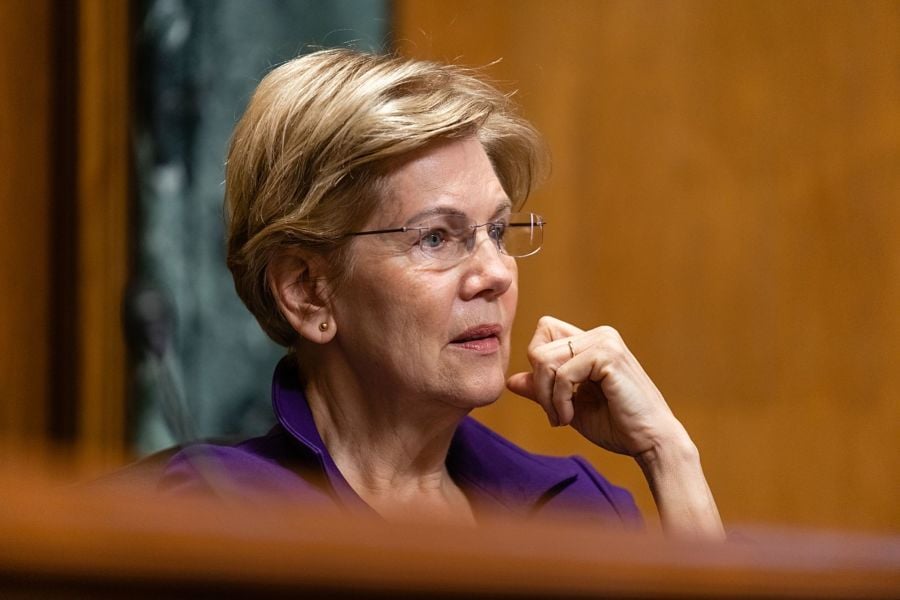

Democratic Senator Elizabeth Warren is pressing Commerce secretary nominee Howard Lutnick on connections he and his firm Cantor Fitzgerald LP have with a company that’s the go-to cryptocurrency of the criminal world, raising questions about potential conflicts of interest ahead of his confirmation hearing on Wednesday.
Warren asked Lutnick about his relationship to Tether Holdings Ltd., including how much he and Cantor Fitzgerald — the Wall Street investment bank and brokerage — have invested in the stablecoin issuer in a letter sent to him Tuesday and seen by Bloomberg News.
She also asked Lutnick to detail any due diligence performed and whether they verified if Tether is in compliance with “know your customer” rules in the Bank Secrecy Act, international sanctions, and anti-money laundering laws.
Lutnick, President Donald Trump’s pick to lead the Commerce Department, did not list Tether or any other crypto investments on his financial disclosure form, which listed assets worth at least $806 million and his involvement in more than 800 legal entities. Cantor Fitzgerald holds a stake in Tether and plays a role in its operations. In his ethics agreement, Lutnick said he would divest all his holdings in Cantor Fitzgerald and its underlying companies if confirmed by the US Senate.
Warren’s letter questions whether those steps are sufficient to avoid conflicts of interest, noting Lutnick’s role as a prominent booster of the stablecoin and his relationship to Giancarlo Devasini, Tether’s billionaire chief financial officer. Lutnick has been Tether’s most prominent booster in the US, hailing the stablecoin as the “digital dollar all over the world.”
The ties to Tether “raise significant questions about your own personal judgment and the conflicts of interest that you will have if you are confirmed,” Warren said in the letter.
Tether did not immediately respond to a request for comment about the letter. The company has denied any ties to criminals and said that it cooperates with law enforcement to freeze the proceeds of illicit activity.
Warren wants Lutnick, who co-chaired Trump’s transition team, to describe any discussions he’s had about Tether with incoming administration officials. And she noted the personal ties Lutnick retains with his firm — he has two sons who work for the Cantor Fitzgerald group — and raised concerns that he might continue to exert control even after selling his holdings.
As Commerce secretary, Lutnick or someone he designates would be part of the working group Trump authorized to undertake a regulatory review of digital asset markets and would have the president’s ear as a member of his cabinet.
The Massachusetts senator asked Lutnick to answer her questions by Feb. 10. Warren is not on the Senate Commerce, Science and Transportation Committee which will hold the confirmation hearing.
Lutnick has come under scrutiny for his close business relationship to Tether, a cryptocurrency that allows users to move money anonymously. North Korea’s regime, Mexican drug traffickers and Southeast Asia-based human traffickers have all been found to use Tether, and US government officials have said Russia has used it to circumvent sanctions and finance its war in Ukraine.
Tether Holdings said this month that it will move its corporate entity and subsidiaries to crypto-friendly El Salvador.
Tether has paid Lutnick’s firm tens of millions of dollars for Cantor’s role in managing its reserve assets and Cantor purchased a minority stake in Tether, according to people with knowledge of their relationship who asked not to be named because the companies view the details as sensitive.
In December, the bank brokered a deal for Tether to invest $775 million in right-wing video platform Rumble Inc., in which Lutnick also holds a stake.

It's a showdown for the ages as wealth managers assess its impact on client portfolios.

CEO Ritik Malhotra is leveraging Savvy Wealth's Fidelity partnership in offers to Commonwealth advisors, alongside “Acquisition Relief Boxes” filled with cookies, brownies, and aspirin.

Fraud losses among Americans 60 and older surged 43 percent in 2024, led by investment schemes involving crypto and social manipulation.

The alternatives giant's new unit, led by a 17-year veteran, will tap into four areas worth an estimated $60 trillion.

"It's like a soap opera," says one senior industry executive.
RIAs face rising regulatory pressure in 2025. Forward-looking firms are responding with embedded technology, not more paperwork.
As inheritances are set to reshape client portfolios and next-gen heirs demand digital-first experiences, firms are retooling their wealth tech stacks and succession models in real time.
